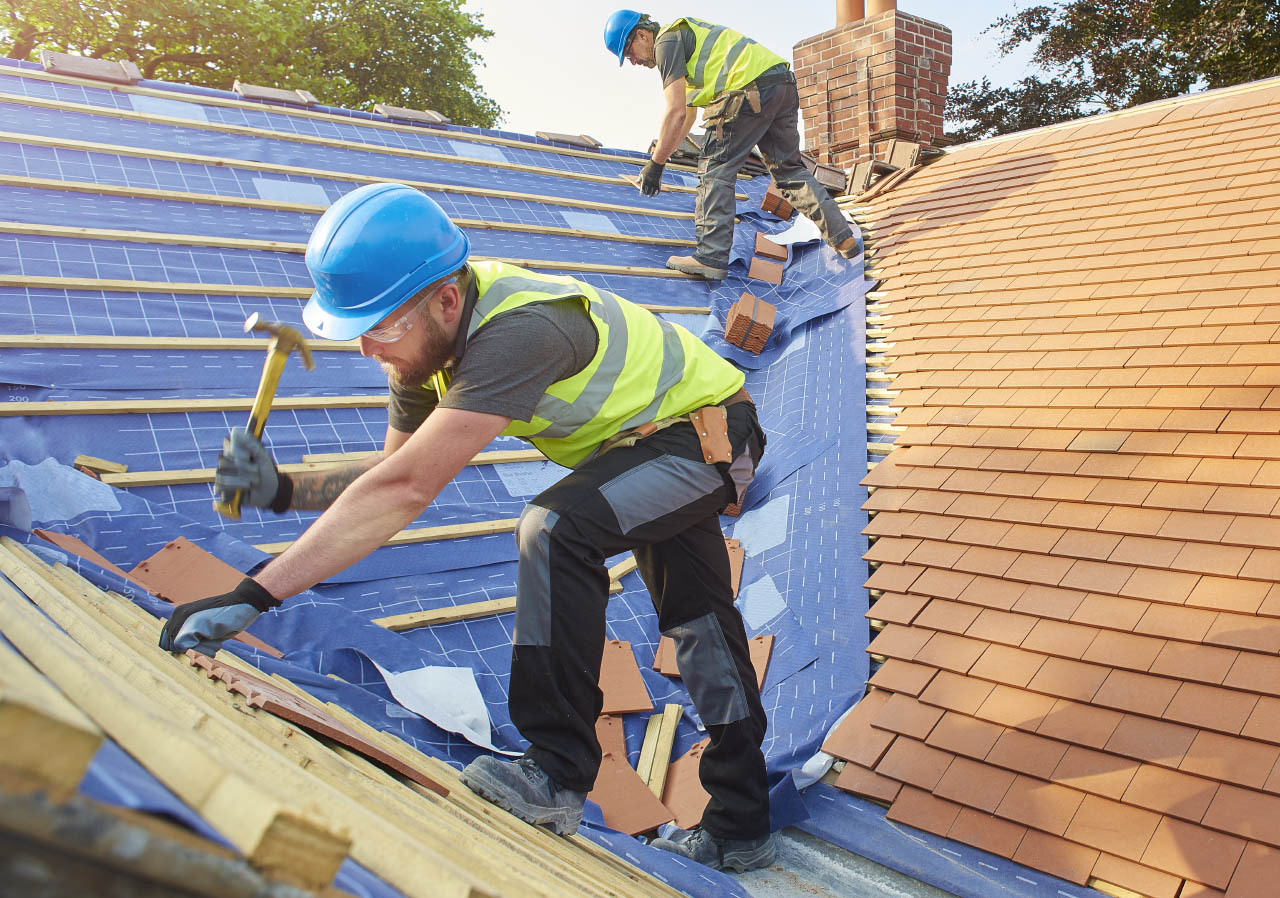Does Home Insurance Cover Roof Replacement?

Homeowners insurance will typically cover roof repairs or replacement in the event of sudden, unpreventable damage as listed in your policy. But does homeowners insurance cover roof replacements on older roofs with years of regular wear and tear? Are there other common perils that aren’t covered in a standard policy that could leave you footing the bill?
Fortunately, there’s a playbook to follow for roof replacements and repairs that can help you understand what’s covered, what’s not, and how to be preventative in saving your roof and money. Our guide can help you stay on top of your game and know what to expect when the unexpected occurs.
Key takeaways:
- Homeowners insurance will typically cover repairs or replacement if there is sudden damage to your roof.
- Repairs needed from general wear and tear, pest damage, and cosmetic damage are not covered by your homeowners insurance.
- Separate policies may be required to fix certain damage from hurricanes, earthquakes, tornadoes, or hail, depending on which state you reside in.
- Investing in better roofing and being proactive with preventative maintenance will help save you money and your roof in the long run.
What kind of roof damage is covered by home insurance?
Dwelling insurance covers roof replacement or repairs for perils or catastrophes explicitly listed in your policy. If your policy lists hail damage as a covered peril and an unexpected hail storm blows through and turns your shingles into Swiss cheese, your home insurance will help you pay for repairs. If your roof has been maintained properly and isn’t too old (15-20 years is when you want to be considering a roof replacement) there’s a good chance it will be covered.
Common perils that cause sudden damage
A peril is an occurrence that causes sudden, unexpected damages or losses to your property, like severe weather or a natural disaster. Your insurance policy will list named perils that will be covered if they occur. Depending on the type of homeowners insurance you have, these common perils may be covered.
- Accidental water or steam discharge
- Burst or broken pipes
- Damage from a sudden electrical surge
- Damage from vehicles or aircrafts
- Falling objects
- Fire
- Frozen AC or heating
- Hurricanes or tornadoes
- Lightning
- Severe wind and hail
- Volcanic eruptions
- Weight of snow, ice, or rain
- Wildfires
What types of roof damage are not covered by your home insurance?
There are some types of roof damage that your home insurance will not cover, such as mold or a pest infestation. For example, say you haven’t performed standard maintenance on your roof in a while and are starting to hear the squeaking and scurrying of woodland creatures in your attic. Squirrels are notorious for chewing through shingles and siding, and if you haven’t taken preventative measures, this adorable infestation won’t just drive you nuts — it will cost you big time.
Common perils that aren’t covered
You can’t avoid natural wear and tear, but being proactive and performing regular checkups and repairs can help you stay ahead of common perils that aren’t typically covered. Below are some common events not usually covered by standard policies.
- Cosmetic damage
- Earthquakes
- Failing to do standard, preventative maintenance
- Floods, landslides, or mudslides
- Foundation issues that cause roof damage
- General wear and tear
- Mold
- Damage from pests or wild animals
Location-based perils that may need separate coverage
Some policies may need additional coverage called an insurance rider depending on your location. If you live in areas with frequent severe perils like tornadoes, hurricanes, earthquakes, and flooding you may need to add a rider to your coverage. This can increase your premium in states like Nebraska, Oklahoma, Florida, Louisiana, and California but it’s better to be safe than sorry.
How to get insurance to pay for roof replacement
If you find yourself in the unfortunate situation where Mother Nature has devastated your roof with her relentless fury, you’ll likely want to find out how to get insurance to pay for roof replacement. Here are the steps to take to put the wheels in motion.
- Document the damage: Take detailed photos and videos of all the damages to your roof and keep all receipts. You will need to submit these with your claim.
- Know your coverage: Review your policy and understand what is covered and what is not. If you have any questions, reach out to your insurance agent.
- File the claim: File the claim online or call your insurance company to file the claim by phone. Filing the claim online may offer options to upload your documentation.
- Make temporary repairs to cut costs: Hire a handyman to complete temporary repairs to keep the situation from getting worse. Document what repairs were made and add these notes to your claim.
- Get quotes from several local roofers: Get quotes from local roof repair companies to estimate the budget.
- Schedule the insurance claims adjuster: The insurance adjuster will survey the damage and approve or deny your claim.
- Get repairs: Once the settlement is approved you may schedule the repairs. The insurance company will likely reimburse you for the leftover cost once you’ve met your deductible.
How your insurance company determines roof coverage
How does your insurance company determine the coverage on your roof? Each house and situation is different, so there isn’t one simple boilerplate process. Your insurance adjuster will consider your location along with the roof’s age, quality of materials, and current condition. Adjusters also consider preventative protection and monitoring services like Smart Home kits.
Roofs over 20 years old might only be insured for up to their cash value. With most policies, a deductible may have to be met before your insurance kicks in to cover it.
Tip: Pairing a home warranty that covers structural damage with home insurance can help maximize your coverage.
Roof repair vs. roof replacement
Does home insurance cover roof repair or replacement? Well, both. The scale for roof repairs ranges from minor DIY repairs and upkeep to full roof replacement. The price range is equally as wide. Here are a few details on what types of repairs you may have to do on your roof and the potential costs.
- Minor repairs: $150-$400
- Moderate repairs: $400-$1,200
- Major repairs: $1,200-$3,500
- Roof replacement: $7,500
Minor repairs include regular, routine maintenance, like sealing small leaks or fixing a small area of damaged or missing shingles. Depending on your skill and comfort level, you could do this work yourself or ask the professionals to help out. (If you happen to be a member of the Hippo family, you could reach out to Hippo Home Care for complimentary advice.)
Moderate repairs include replacing a medium-sized area of shingles and flashing and fixing/sealing fixtures.
Major repairs include repairing chimneys and skylights, replacing a large area of shingles, and replacing damaged wood.
How to prevent roof damage
Home insurance is there when you need it, but being proactive with routine maintenance can prevent many issues with your roof before they begin. Here are a few things you can do to keep your roof in tip-top shape.
- Regular maintenance checks/inspections: Self-check for leaks, mold, and loose, bowed, missing, or damaged shingles every six months. Schedule a professional to come out every three to five years.
- Prune nearby trees: Trim nearby tree branches so they never have a chance to damage your roof during a storm.
- Clean your gutters: Clogged gutters can cause water damage, leaks, and roof rot. Clear leaves and debris from your gutters so water can drain to the ground.
- Remove snow from your roof: Even if you know how to prepare for a blizzard, sometimes keeping snow from piling up on your roof is unavoidable. Heavy snow puts stress on your roof and can cause damage. Call a professional to remove snow from your roof if there is significant snowfall.
- Insulate well: Good insulation, especially in the attic, keeps hot and cold air from escaping through the roof, reducing strain on the shingles.
- Upgrade your shingles: Storm-proof your roof with high-quality, impact-resistant shingles. It’s an investment up front but will pay for itself with fewer claims. Check with your insurance company to see if they offer discounts on your premium if you upgrade.
Will homeowners insurance cover a new roof? Home insurance will cover roof replacement if a sudden, unpreventable, perilous event causes excessive damage and the roof was otherwise in good shape and well maintained. Being proactive to prevent unnecessary roof damage takes just a small amount of work to save yourself a headache in the long run.
Hippo helps you secure proactive homeowners insurance to help you protect your home ahead of time so you’re prepared when the unexpected occurs.



